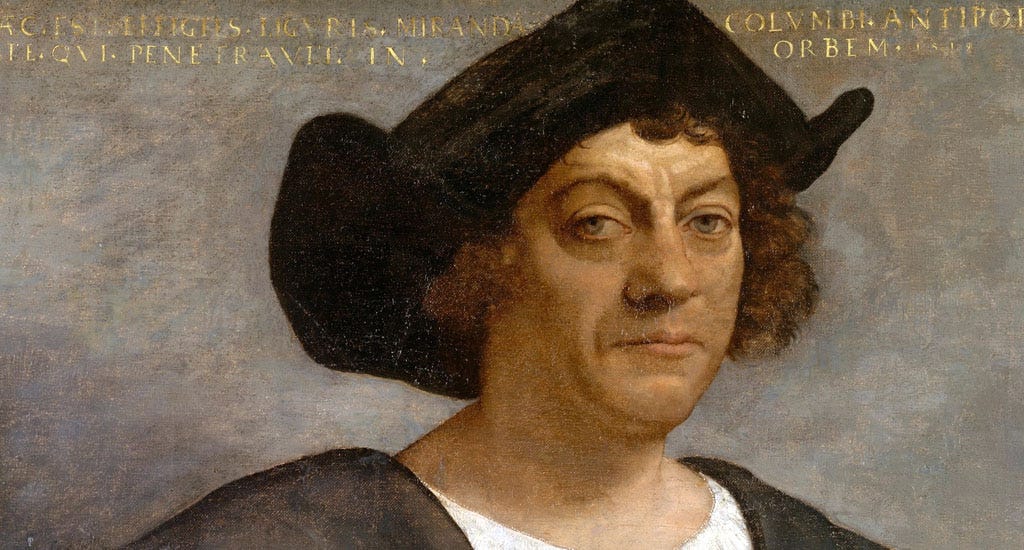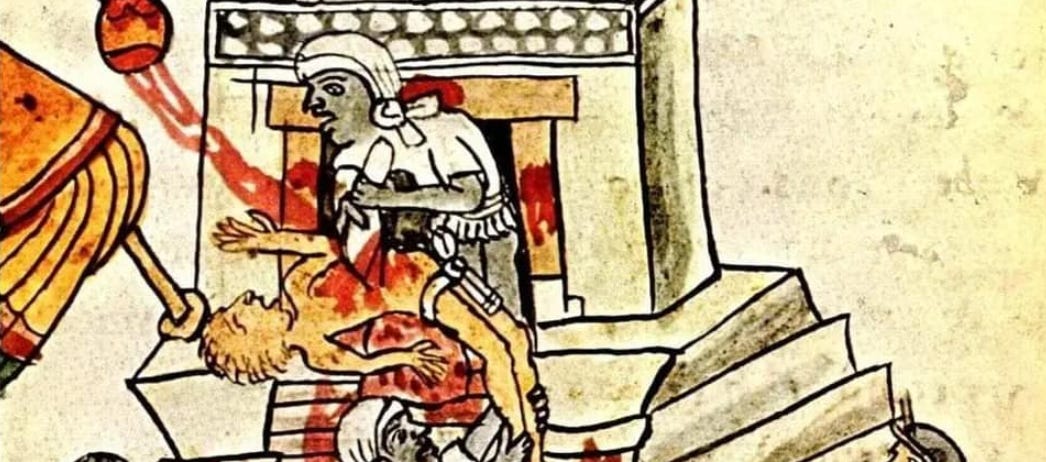Happy Columbus Day (And Don't Forget It)
They can rename our holidays -- but only if we let them.
"I forbade worthless things being given to them, such as bits of broken bowls, pieces of glass, and old straps, although they were as much pleased to get them as if they were the finest jewels in the world. Even bits of the broken hoops of wine casks they accepted, and gave in return what they had, like fools, and it seemed wrong to me. I forbade it, and gave a thousand good and pretty things that I had to win their love and to induce them to become Christians, and to love and serve their Highnesses and the whole Castilian nation, and help to get for us things they have in abundance, which are necessary to us."
-- Christopher Columbus, Letter to the Sovereigns (1493)
Allow me to make the case.
Christopher Columbus was a great man. Not a good man who did some bad things but was on the balance good, not an evil colonialist who pillaged and plundered the riches of a foreign peoples. Columbus was not only a good man who aspired to holiness in a broken world, but deplored the excesses of both worlds both New and Old.
Now before folks come in with their buts and ands, let’s remind one another that the 15th century Castilian world that Columbus brought to the New World was by no means a Shangri-la. Nor was the New World some sort of egalitarian paradise whose only experience of violence came at the hands of the conquistadors. In fact, the New World was a world where the propitiation of the gods required something far more violent and cruel than anything encountered in the Christian West:
In fact, in 1487 to celebrate a great victory over their enemies, the Aztecs slaughtered 84,000 people during the course of four days:
“[The Aztecs were] a culture obsessed with death: they believed that human sacrifice was the highest form of karmic healing. When the Great Pyramid of Tenochtitlan was consecrated in 1487 the Aztecs recorded that 84,000 people were slaughtered in four days. Self-sacrifice was common and individuals would pierce their ears, tongues and genitals to nourish the floors of temples with their blood. Unsurprisingly, there is evidence that Mexico was already suffering from a demographic crisis before the Spanish arrived.”
Men.
Women.
Children.
No world needed a Christ more.
The Liberation of Two Continents From Human Sacrifice
“Great spirits have always found violent opposition from mediocrities. The latter cannot understand it when a man does not thoughtlessly submit to hereditary prejudices but honestly and courageously uses his intelligence and fulfills the duty to express the results of his thoughts in clear form.”
— Albert Einstein, Letter to Morris Raphael Cohen defending Bertand Russell’s appointment (1940)
One of my more favorite observations is that in most societies, you can have liberty or equality — but you cannot have both. One can only see the valleys and peaks from the lowest or highest points, but an equality becomes a featureless plain.
No small wonder why we destroy the statues of our heroes. No small wonder why we are unworthy of such heroes when we fail to defend them.
Columbus did not put a stop to the violence of the Aztecs and Incas, though he certainly set the stage to end the regime of human sacrifice. Other Spanish conquistadores would have the privilege of doing so, replacing the sclerotic and pagan emperors of old with the Spanish encomienda — the only known system that enslaved and then liberated an entire people without the need for revolutionary violence. Indeed, the Spanish government itself was pressured by late Jesuit scholastics such as Luis de Molina to do precisely this.
The political left likes to remind others that the arc of history bends towards justice, as if progress itself were a god to be propitiated by the blood and sacrifice of fellow revolutionaries.
For some reason, this courtesy is never extended to the Christian West under any form — whether it is the Spanish conquistadores, the defense of Christendom against Moors and Turks during the Crusades, the crowning achievements of the Enlightenment, the spread of the demokratia or the defense of human freedom during three world wars — First, Second and Cold.
The Racism Of The Elizabethan “Black Legend”
So why is it that progressives seem to genuinely hate Christopher Columbus? Why is it that they repeat all of the so-called savagery of Spanish imperialism while evading the role of what Virginius Dabney so aptly referred to as “that cargo of witchburners” dumped upon the shores of Plymouth Rock in 1620?
The roots of this progressive hate has much more to do with Puritanical racism against the Spanish — and a healthy dose of anti-Catholicism — than they would care to admit publicly.
New England hostility towards the Cavalier spirit has enjoyed a good 400-year run; its virility demonstrated in the rhetoric of woke progressives against the sensibilities of conservatives and traditionalists alike.
At core is the worst sort of tyranny — those who simply know better.
Virginians have been treated to this Puritanical sentiment recently when Terry McAuliffe said the quiet part out loud regarding whether parents ought to have a say in the education of their children.
The Elizabethans were no different. Not because Elizabeth I had any actual animosity towards Catholics during her reign. At least, not until they tried to kill her, send Jesuit assassins, and nearly landed a Spanish-Flemish army on the coast of southern England in an attempt to overthrow the Tudor dynasty.
Instead, the Elizabethans took up both pen and sword and pushed back the Spanish along every front. Columbus among them wasn’t just evil — he was also a suspected Jew. Spanish conquistadores in league with Jesuits raped and plundered the New World in sharp contrast to the Anglo-Saxon Anglicans who sought to build Jerusalem on the shores of the North Atlantic.
Good guys.
Bad guys.
Yet it did not matter that Columbus et al. brought Christianity to the New World. Nor did it matter that the old religions of the Aztec Empire and Incan Empire with their propitiation of the gods through human sacrifice would lie dormant for 350 years until the rise of new secular gods.
All that mattered was that a political narrative could fit a political agenda.
What Columbus Day Means To Catholic Immigrants and Why It Is Important Moving Forward
Of course, that political narrative of America as a uniquely Protestant nation continues to feed our present day perspectives — to a point.
One almost strains themselves to point out that religious freedom flourished in a Protestant America in a way that it could never thrive in Catholic countries.
Yet the Catholic Church — and Catholic immigrants — flourished in the late 19th and early 20th centuries precisely because the American system allowed total freedom to build hospitals, clinics, schools, universities, their own associations such as the Knights of Columbus, their own labor unions, aid agencies, charitable institutions and finally their own gravesites.
By one I mean me.
Yet the debate still raged. Can Catholics be good Catholics and good Americans if our loyalties — according to the Black Legend — remained to Rome and not Washington?
Columbus Day was the way for Irish, Slavic, Italian, Hungarian, German, Polish, Ukrainian, Hispanic and other immigrants to affirm with a full heart that the answer was an unqualified YES. It is the holiday that makes us American Catholics and not Catholic Americans.
Christopher Columbus offers Catholics the chance to say that we have a hand in the founding of the American experiment. Discovered by Catholics, mapped by Catholics, with the brother of America’s first cardinal signing both the Declaration of Independence and the U.S. Constitution, participating in public life, crowning our acceptability by squaring off against the Ku Klux Klan’s nativism in the 1920s and finally nominating and electing an anti-communist Catholic president of our own — all of that really does matter and ought to matter.
One notes that during the leveling of our monuments and statues over the last five years, one argument was made that — rather than bulldoze our history — we ought to reach out and find new ones.
Christopher Columbus was precisely that sort of hero. Columbus was a pious man who took an impoverished Spain who struggled for 400 years against Moorish colonization and by his own discovery turned Castile into one of the great powers of the world. Columbus prayed fervently, deplored the abuses of his countrymen, and fought relentlessly to spread the Gospel against a barbarous system of oppression and human sacrifice.
Was he a 21st century progressive? By no means. Yet much like Thomas Jefferson and the values and mores of the 18th century, Columbus is celebrated precisely because he rose above the milieu of his time period and sought a better world — and though he did not achieve it, Columbus certainly set the world on a better path.
Would that Columbus have landed in 1487 rather than 1492. Perhaps the 84,000 souls sacrificed by the Aztecs over four long days might have lived to celebrate his name as well.
Columbus Day = Let’s Go Brandon
As for this so-called secular holiday of Indigenous People’s Day, one really struggles to contemplate what precisely we recognized in 2021.
Were there commemorations? Certainly a few tweets and social media exhortations, but nothing that really honored the day in the spirit one suspects proponents wanted. Did a single soul breathe easier? Was a single soul educated? Was anyone fed? Visited in hospital? Which Beatitude did we fulfill?
None, I’d say.
In fact we did the worst thing possible. We created a holiday where white liberals and their bitter clingers can now feel better about their guilt. The past is recognized, but the gods are not propitiated.
As if renaming things was the pinnacle of social justice?
Of course, they only win if we allow them to conquer the language with the colonialism of the mind. The Soviets tried this; Vaclav Havel counterpunched with his Power for the Powerless in 1978:
On the one hand, there was the sterile puritanism of the posttotalitarian establishment and, on the other hand, unknown young people who wanted no more than to be able to live within the truth, to play the music they enjoyed, to sing songs that were relevant to their lives, and to live freely in dignity and partnership. These people had no past history of political activity. They were not highly motivated members of the opposition with political ambitions, nor were they former politicians expelled from the power structures. They had been given every opportunity to adapt to the status quo, to accept the principles of living within a lie and thus to enjoy life undisturbed by the authorities. Yet they decided on a different course.
Want to see what that sort of resistance looks like in the face of rainbow flags in every store, Antifa burning downtown districts, BLM paraphernalia, Critical Race Theory in the classroom, and Democratic politicians scolding parents about how they should have zero role in the education of their children?
That’s 1,200 people in Chesterfield this weekend figuring it out.
Happy Columbus Day weekend, folks.
Shaun Kenney is the editor of The Republican Standard, former chairman of the Board of Supervisors for Fluvanna County, and a former executive director of the Republican Party of Virginia.







